- a specialized financial agency of the United Nations

| the IMF
- International Monetary Fund
- a specialized financial agency of the United Nations |
 |
last updated 2022
Oct 13th
.
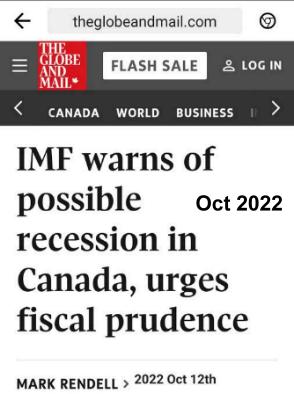 |
Wednesday (2022 Oct 12th),
"IMF staff said growth in Canada is expected to slow to 1.5 per cent in
2023 from 3.3 per cent in 2022. The unemployment rate could rise to above
6%"
".. economists at Canadaís
biggest bank warned that the country is likely fall into recession sooner
than they had expected." as quoted in the Edmonton Journal.
|
| INTRODUCTION | This unit discusses
|
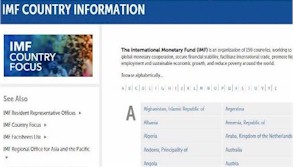 |
Sources
of Information :
IMF country reports imf.org/en/Countries For students of international
business, the IMF has a detailed page listing the countries of the world,
and links to reports and analysis the IMF has done over the years
- such reports are valuable to persons developing international marketing
plans and Threat,
Risk and Analysis Reports
|
| What
does the IMF do |
What
does the IMF do to help countries in trouble, particularly trouble with
exchange rate fluctuations?
|
| World
Bank
IMF for the BRICS nations |
2014
July
BRICS nations
One of the things the BRICS made a point of announcing is that the management of the bank will be "democratic", while pointing out that the IMF and the World Bank are run mostly by Europeans and North Americans. source
|
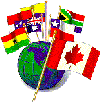 |
Canada and
the IMF
"As a result of the relatively large size of the Canadian economy, and its openness to international trade, Canada has a significant voting share at the IMF." Dept. of Finance, Ottawa The government of Canada
is also aware that being an export led economy, it is helpful to our country
if the rest of the world is doing well economically in order to buy our
exports - which means the IMF's work in lending money and helping with
exchange rate fluctuations contributes to an economic climate favourable
to trade.
Canada is involved in running the IMF. A Canadian has historically held a seat on the Executive Board. This Board is composed of 5 appointed member countries and 19 elected member countries and constituencies. Voting Share Percentages
of the Largest Members of the IMF
Canadian Government website
discussing the IMF
IMF website discussing Canada
|
||
"
| What
does the IMF do |
What
does the IMF do to help countries in trouble
"The
IMF negotiates with a country to provide financial assistance if the country
will agree to adopt certain policies to stabilize its economy"
|
"The IMF has a surveillance
program where it monitors the economic policies of countries that would
affect those countries exchange rates".
Daniels
From the IMF website http://www.imf.org/external/np/exr/facts/banking.htm
"The IMF seeks to improve
a country's macroeconomic environment and policies through a regular dialogue
with its national authorities. As regards financial system surveillance
in particular, the IMF, in cooperation with other institutions and
as part of its adaptation to the demands of the global economy, is
deepening its surveillance and emphasizing its quest for transparency by
a further increase in the coverage of financial system issues. Such
efforts are designed to lessen the frequency and diminish the intensity
of financial system problems in the future, through better identifying
financial system strengths as well as potential weaknesses
that could have major macroeconomic implications."
.
.
 |
"Bosnian Vets Riot for
pay"
To keep in line with IMF requirements for receiving financial aid, the Bosnian government announced they would cut back on benefits to Bosnia war veterns (April 2010) |
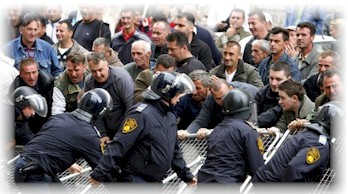 |
Veterans of Bosnia's 1992-1995
war rioted with police in the 3rd week of April 2010 when the government
threatened to cut back on their pensions and benefits.
These government cutbacks were one of the things the IMF required of the Bosnian government in order for them to comply with austerity measures and conditions that came with receiving money from the IMF. |
| According to the IMF deal, Bosnia's two regions (the Muslim-Croat federation and the Serb Republic) have to cut public spending [which is often a condition the IMF imposes on many recipient countries]. In the case of Bosnia, a large part of their government spending goes to generous pensions paid to ex-soldiers. |
 |
"Pakistan gets IMF bailout,
but problems persist "
is the title of an East-Asian newspaper story in Oct 2000 |
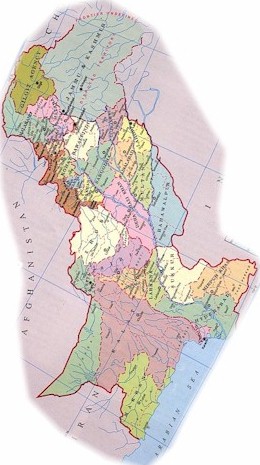 |
In Pakistan in
1999, Nawaz Sharif was overthrown by General Pervez Musharraf. Despite
the fact that it was a military takeover the General was quite aware of
the power of the IMF in the context of his country's sovereignty and said
he would do his best to appease the IMF.
Pakistan has been trying hard to stay solvent, as a country and receiving money from the IMF has been key. Pakistan turned to the IMF
for an emergency package of $7.6 billion in November 2008 to avert a balance
of payments crisis and shore up reserves.
What are the problems? The IMF has required that the government of Pakistan create a VAT (Value Added Tax law) and impliment this by July 2010. Given Pakistan's volitile political situation few politicians want to push this idea since it will make them very unpopular to get elected. As for other methods of collecting money, the government raised electricity charges by more than 16 per cent since October 2009, but the IMF is seeking a further hike. |
up-to-date information on
the IMF and Pakistan can be read online at
www.imf.org/external/country/pak/index.htm
.
 |
South Korea
the Positive & Negative Impact of the 1997 IMF bailout plan on South Korea |
Positive Impact
"Since the implementation
of the plan, Koreans have by and large engaged in less over-consumption
and have been shifting towards the purchase of cheaper and domestically
produced goods. Imports of foreign goods like automobiles and liquor have
also fallen, which has helped alleviate their huge trade deficits."
.
| KEY
POINTS |
The problem of over-consumption
is said to be a consequence of the world-wide marketing drives of North
American and European consumer products companies. These marketing activities
has caused a demand among people (in many countries of the world)
that do not have the money to afford the products - so they borrow in order
to acquire, what many consider, non-essential items.
WTGR |
CNN reported the situation
in South Korea in November 1997 saying
www.cnn.com/WORLD/9711/22/s.korea.imf/
"South Korea announced it
was asking the IMF to organize a bailout package. In exchange, the
IMF is likely to order deep spending cuts, lower import tariffs,
higher domestic taxes, the elimination of shaky banks, and the forfeiture
of some national decision-making power to lenders"
.
How did the situation
develop in South Korea that required the IMF?
CNN says "the answer seemed to be unanimous: corrupt politicians and businessmen who wheeled and dealed during South Korea's boom years."
"South Korea's stunning economic
growth rates -- averaging 8 percent annually over the past two decades
-- were largely fueled by the fast expansion of a dozen family-controlled
conglomerates. Past military governments provided cheap loans, tax
breaks and other benefits to help the corporate giants expand and mass-produce
cars, television sets, microchips, petroleum products and other goods.
The business groups account for half of South Korea's industrial output
and lead its export-driven economy. They supply one-quarter of the world's
computer memory chips and account for about 30 percent of the commercial
shipbuilding orders. The economic boom also had negative impacts,
triggering unbridled land speculation and environmental exploitation. Bribes
to police and public officials became common. The problems came to
a head this year when the economy slowed down, sales dropped, and some
of the weaker conglomerates went belly up, saddling banks with $26 billion
in bad loans."
.
| Mexico 1995 |
How did Mexico get help?
"IMF pledged up to 17.8 billion
dollars in financial assistance in the form of a stand-by arrangement to
be disbursed over an 18 month period. Additionally, the Bank of Canada
pledged 1.5 billion Canadian dollars (approximately 1.1 billion US dollars)"
.
| Indonesia
"Under heavy pressure from wealthy nations that control its policies, the fund demanded a king's ransom from Indonesia as the price for its $40 billion assistance package." |
"Study Says IMF's Hand Often Heavy"
Kahn writes an article based on a [2000] study of how the IMF made decisions on several countries. The study was done by Morris Goldstein, who is now an economist at the Institute for International Economics
Kahn writes "Terms for rescuing nations from economic oblivion around the world during the emerging-market financial crisis of the late 1990's, was often criticized as the International Monetary Fund's equivalent of imperial overstretch. Now a new study using the fund's own unpublished data suggests that the critique may have actually underestimated the fund's commandeering approach.
Kahn says "Indonesia was
told to raise taxes on state-owned companies; cancel 12 road, bridge and
port projects; remove protections on dairy farmers; and eliminate price
controls on cement ó part of a long list that at one point included 140
items, the study shows. The idea was to convert Mr. Suharto's
Indonesia, which had a partly capitalist economy plagued by corruption,
into an open, competitive and stable free market economy. Even though few
mainstream economists argue with the goal, the methods are coming
under new scrutiny. "I think it's clear that both the scope and the
depth of the fund's conditions were excessive," said Morris Goldstein.
Goldstein said that the recent push for radical overhauls of nations that
borrow money has undermined the fund's reputation and strained its competence.
"They clearly strayed outside their area of expertise," Mr. Goldstein said.
"If a nation is so plagued with problems that it needs to make 140 changes
before it can borrow, then maybe the fund should not lend."
.
| Argentina
"Argentina secured a US$4- billion lending package in December, 2000, that was led by the IMF" |
Jacqueline Thorpe wrote a
story in the Financial Post, in July 2001 that said "... International
Monetary Fund said it was not studying plans to grant Argentina more funds
to help it through its financial crunch."
| KEY
POINTS |
The Argentinian government
has publically stated a variety of plans to solve it's crumbling economy
- but one of the stumbling blocks (which was also a problem in Russia)
is collecting tax: - tax evasion remains a big problem. The IMF expresses
concern about Argentina's problems collecting taxes from businesses because
if the government cannot collect money to pay the debt, then the economy
will collapse completely.
WTGR |
McMahon's article explains how Argentina developed problems and how those problems are compounded today by situations that will be difficult to change.
"... Argentina has huge policy problems, especially at the micro level. That's led to trouble with costs and productivity...The economy is highly politicized and corruption is rampant. Key government duties, like education and infrastructure, get neglected..."
McMahon's complete text is
at
http://www.witiger.com/internationalbusiness/IMF~argentina.htm
Fred McMahon manages the
Economic Freedom of the World report at the Vancouver-based Fraser Institute.
E-mail: fredm@fraserinstitute.ca
.
| Japan
examples of IMF commentary on large economies |
| KEY
POINTS |
The reason for mentioning
Japan is that Japan is the second largest trading partner with Canada -
therefore things which negatively effect the ability of the Japanese economy
will impact on Canada.
WTGR |
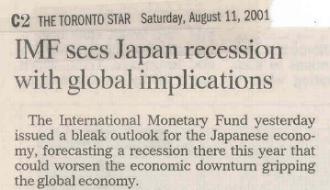 |
article from the Toronto Star about the IMF's concern about the global implications of a recession in Japan [2001] |
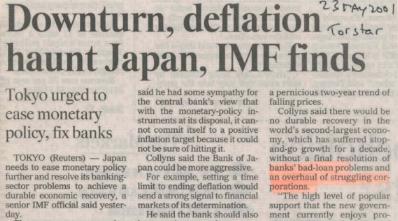 |
An earlier article in May
2001 about the IMF concern for Japan.
IMF states that "Japan needs to ease monetary policy"
|
 |
What are
the sources of IMF finance?
Answer - Special
Drawing Rights SDR
The SDR is an international
reserve asset created to supplement member's existing reserve assets. SDR's
serve as the IMF's unit of account and are used by the IMF for transactions
and operations"
" The bulk of the IMFís resources derives from membersí subscriptions (called quotas) that are based on each memberís relative size in the world economy. Quotas determine the maximum amount of financial resources that a member is obligated to provide to the IMF, voting power in IMF decision-making, and a memberís share of Special Drawing Rights (SDR) allocations (the international reserve asset created by the IMF). The financial assistance a member may obtain from the IMF is also based on its quota." |
| KEY
POINTS |
In
order to lend money to someone - you have to possess money yourself. If
you want to lend a large amount of money - you need to possess an equally
large amount of money.
It sounds simple but it is a fundamental way of looking at how the IMF works. The IMF itself does not have under its own control enough money to lend to those who need it - so - what it does is hold money given to it my wealthier nations and with this money it in turn lends it out to those that need it. WTGR |
In what form does the SDR exist?
"Initially, the value of
the SDR was defined in terms of one US-$, which in turn was defined in
terms of an ounce of gold: $35/oz until 18-Dec-1971; Since July 1974 the
SDR has been defined in terms of a basket of currencies. This basket consisted
initially of 16 currencies and was reduced to 5 in 1981." [WTGR - it was
further reduced to 4 currencies in 2000]
http://pacific.commerce.ubc.ca/xr/SDR.html
The SDR is not physical
money like gold or some other currency - it is a value unit composed of
the
"weighted average of five
[now 4] currencies"
| KEY
POINTS |
Because the SDR is composed
of 4 currencies, its value changes all the time because the value of those
4 currencies is always changing on the world market in relationship to
each other - so the IMF posts a page on its site identifying this value.
WTGR |
These currencies that make up the SDR are
| (5 currencies in the 1990's)
o U.S. dollar o Euro (Germany) o Japanese Yen o Euro (France) |
(changed to 4 currencies
in Y2K)
o U.S. dollar $ o Euro o Japanese Yen ¥ o British Pound £ |
Since 1981, the weight of
each of these currencies has been changing every 5 years. The table below
shows the weights for the present, and immediate past periods.
Old weighted
values 1991 - 1998
|
New weighted
values 1999 - 2005
|
|||||||||||||||||||||||||||||||||||||||||||||||||||||||||||||||||||||||||||
| Criticism of the IMF | The
IMF is criticized on many front, one of the popular challenges deals with
the way the IMF encourages (some people say "forces" companies to "open
up" their economy.
Capital market liberalization "The IMF pressures countries that petition for IMF loans to open their markets to outside investment capital. Rather than help matters, this approach often makes matters worse as it destabilizes the economy of the country as well as the global economy. Investors may invest huge sums in a country only to pull those investments at a momentís notice, causing acute economic crises." from
Stiglitz, Joseph E. 2002. Globalization and Its Discontents. New York:
Norton. Ch.8, pp.195-213.
|
| IMF
commentary |
Leaders of
NGOs like the IMG, World Bank, OECD often seek to gain publicity for their
organizations by issuing statements about world events and commentary on
the development of situations.
The head of the IMF and the World Bank are often quoted in major newspapers and online media sources for their statements on current issues In November of 2005, Rodrigo
Rato, current Managing Director, was quoted by Associated Press as saying
|
| IMF
forecasts |
NGOs like the
IMG, World Bank, OECD often seek to publicity for their publications, reports
and forecasts. Many times these reports are used by other governments and
organizations around the world to support various conclusions.
|
IMF
vs. World Bank
 |
MGTC44 student
David D. sent Prof. Richardson an email in October 2005 saying
"The
differences between the IMF and World Bank are difficult to grasp when
initially introduced, and consequently easily confused. I found
this link on the IMF site and thought it may be of help to those students
having difficulty differentiate the two"
WTGR replies
|
| IMF
vs. World Bank |
fromwww.imf.org/external/pubs/ft/exrp/differ/differ.htm
"The fundamental difference is this: the [World] Bank is primarily a development institution; the IMF is a cooperative institution that seeks to maintain an orderly system of payments and receipts between nations" "To help nations ... the IMF administers a pool of money from which members can borrow when they are in trouble. The IMF is not, however, primarily a lending institution as is the Bank. It is first and foremost an overseer of its members' monetary and exchange rate policies... It receives frequent reports on members' economic policies and prospects, which it debates, [and] comments on..." "IMF is not a bank and does not intermediate between investors and recipients. Nevertheless, it has at its disposal significant resources, presently [2005] valued at over $215 billion. These resources come from quota subscriptions, or membership fees, paid in by the IMF's 182 member countries. Each member contributes to this pool of resources a certain amount of money proportionate to its economic size and strength (richer countries pay more, poorer less). While the Bank borrows and lends, the IMF is more like a credit union whose members have access to a common pool of resources (the sum total of their individual contributions) to assist them in times of need.." |
On the IMF website, it states
"Creating links to our website is freely permitted..."
The IMF also states
"Fair use of IMF published content for such purposes as criticism, comment
... teaching, scholarship, ...is freely authorized for up to 1,000 words..."
see www.imf.org/external/pubs/rights.htm
July 7th, 2005 Shirley Davies,
Authorized Agent, Copyright, IMF emailed Prof. Richardson to give permission
for linking and quoting from the IMF site.
Copies of emails on file
in the permissions binder.
.
|
|
CONTACT I MAIN PAGE I NEWS GALLERY I E-BIZ SHORTCUTS I INT'L BIZ SHORTCUTS I MKTG&BUSINESS SHORTCUTS I TEACHING SCHEDULE |
| . | |
| MISTAKES ITEXTS USED I IMAGES I RANK IDISCLAIMER I STUDENT CONTRIBUTORS I FORMER STUDENTS I | |
| . |
Prof. W. Tim G.
Richardson © www.witiger.com ![]()